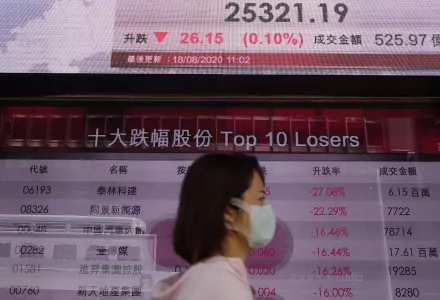Article

Our weekly COVID-19 and Economic Diplomacy tracker looks at policies that impact the coordination of international governments and central banks, ongoing commentary and analysis, and asks what these turbulent times mean for economic diplomacy.
We’d love to hear what you think. Send us your comments, and be sure to follow us on Twitter @BelferEDI.
The Highlights
- Experts are concerned that the U.S. economy could struggle to recover as states face a $555 billion budget shortfall through FY2022. Trump’s executive order extending unemployment benefits at $300/week may only provide three weeks of relief to workers.
- EU employment fell by 2.6% in the second quarter, the largest recorded drop in its history. As the UK furlough scheme comes to an end, the country potentially faces a white collar jobs crisis.
- The African Union’s trade commissioner calls for intra-African trade as FDI investment is expected to drop 25% to 40% this year. The commissioner’s calls come as the AU finalizes a continent-wide free trade agreement.
U.S. Developments
- During the last recession, the U.S. economy struggled to recover in large part due to state and local governments that cut spending and workers amid budget shortfalls. This dynamic once again poses a threat to the U.S. economic recovery post-pandemic. As state governments cover soaring unemployment and healthcare costs amid plunging revenues, they could face a $555 billion budget gap through FY2022.
- Analysis by the Federal Reserve Bank of New York found that families with children took a comparatively harder hit in terms of jobs and income. Drawing on data from the monthly Survey of Consumer Expectations, household heads lost their jobs in 12.9% of families with children compared to 9.2% in households without children. In single-parent households, 23.2% lost their jobs. Though 30.8% of households overall reported a decline in household income, 39% of households with children and 42.1% of single parent households experienced a decline.
- President of the San Francisco Federal Reserve Mary Daly told reporters that some jobs may never come back. Even after the economy rebounds, Daly is concerned about the long-term impacts on the most severely impacted sectors, particularly gyms and movie theaters. Her comments reflect the worries at the Fed of prolonged U.S. economic underperformance as the country struggles to control the pandemic. Presidents of the Boston and Dallas Fed echoed these sentiments. Daly is also concerned that the long-term economic effect will likely be felt most by those with less education, stating “this is going to have a really uneven impact.”
- Trump’s executive order on unemployment benefits may only provide three weeks of relief. Workers will receive $300 in unemployment benefits a week with funds coming from a federal disaster relief fund managed by FEMA. FEMA will initially disperse three weeks of funding to states; additional funding depends on the amount remaining in the program, which is capped at $44 billion.
- Months into a $3 billion U.S. effort to manufacture ventilators, the government stockpile is facing a glut. Manufacturers have delivered more than 94,000 ventilators to the stockpile as directed by the federal Defense Production Act; however, as the approach to treating Covid-19 has changed, the vast majority of these ventilators are going unused. The Department of Health and Human Services has handed out 15,057 ventilators; 95,713 remain in the federal stockpile. Of those, 94,352 came from contracts signed since the beginning of the pandemic.
European Developments
- The number of employed people in the EU dropped by 2.6% in the second quarter, representing 5.5 million job losses, a record amount. Across the eurozone, the percentage was higher with a 2.8% drop in the number of employed workers. These numbers do not include most of the tens of millions of people furloughed across Europe.
- As the UK furlough scheme winds down, many white collar jobs are at risk of being cut. According to research conducted for the Financial Times by one of the UK’s largest recruitment agencies, close to 50% of vacancies are for white-collar positions. Analysts state that these next few months will prove crucial in determining the extent of the white collar jobs crisis.
- The UK reversed its decision to estimate student performance on exams based on an algorithm. Instead, results will be based on whichever is higher: the algorithm approximation or teacher estimates. The algorithm produced lower A-level scores compared to teacher predictions for 40% of students in England. The change comes amid protests and public outcry that the results appeared to benefit students at exclusive private schools and penalized high-performing students from disadvantaged backgrounds, jeopardizing some student’s admission to universities.
Emerging Markets
- The African Union’s commissioner for trade and industry Albert Muchanga called for intra-African trade as foreign direct investment has collapsed during the pandemic. The total value of greenfield investments in Africa fell 58% year-on-year in the first three months of 2020. FDI flows are expected to contract by 25% to 40% this year. Muchanga stated that in order to drive growth, African nations should focus on domestic production and intra-African trade. His calls come as he leads efforts to finalize the Africa Continental Free Trade Area agreement (AfCFTA), creating a single tariff-free $3 trillion market ahead of its January 1 implementation date.
- Turkey’s finance minister Berat Albayrak conceded that the country’s economy is at risk of shrinking. Acknowledging that the previous forecast of 5% expansion is no longer within reach, Albayrak said the economy could shrink by up to 2% or expand by a maximum of 1%. The IMF forecasts that the Turkish economy will contract by 5%; the World Bank estimates a 3.8% fall.
- China’s share of global experts has fallen as result of its trade dispute with the U.S. Multinational companies are rethinking supply chains and are looking to reduce their dependency as China given the trade dispute, Covid-19 pandemic, corporate governance demands, and rise of AI. Last year, Chinese exports of 1,200 products accounted for 22% of the world’s exports, down 3 percentage points from the previous year. For consumer goods, the country’s global market share fell by 4 percentage points to 42%.
Odds and Ends
- Sun Yu and Yuan Yang of the Financial Times provide a deep dive into why China’s economic recovery from Covid-19 is widening the wealth gap. The Economist writes that Xi Jinping’s new economic agenda, ‘Xinomics’ is reinventing state capitalism.
- Since the start of remote work, digital crime has surged. The FBI reports that daily digital crime has risen by 75% since the start of stay-at-home restrictions and the number of complaints received thus far in 2020 has already exceeded the total for 2019.
- Brookings has published a number of reports on COVID-19’s impact across the spectrum. Bradley Hardy and Trevor Logan write on how the economic and public health crisis has disproportionately affected Black Americans. Homi Kharas and Megan Dooley provide proposals for how emerging economies can raise large, sustainable amounts of development financing. Jevay Grooms, Alberto Ortega, and Joaquin Alfred-Angel Rubalcaba write that essential workers and Black and Hispanic households face additional social and economic disparities.
- In a study by Amfar, counties with the highest percentage of White residents have had the lowest rates of Covid-19 infections, an indication that residential segregation is a significant factor in virus spread. The higher rate of infection in Black, Latino, and Native American communities is due to “poverty and living in dense households, living in localities with greater air pollution, lack of health insurance, and being employed in jobs that increase exposure to” the coronavirus.
- Lack of access at home to high-speed Internet service will leave millions of students behind as schools go online. In 2018, nearly 17 million children did not have high-speed internet and more than 7 million did not have computers at home. Nearly 33% of Black, Latino, and Native American households lack high-speed internet.
- Nationwide, Hispanic or Latina mothers make up nearly half of coronavirus cases among pregnant women. According to CDC data, among more than 14,100 pregnant women who tested positive for COVID-19, 6,447 were Latina. In a study in Philadelphia, Penn researchers found that Black and Hispanic women were exposed to the virus at a rate five times higher than White and Asian women.
- Keegan Hamilton and Keri Blakinger report for Vice that whistleblowers say that dozens of prisoners have tested positive for COVID-19 after being moved between jails and federal prisons due to lack of safeguards in the Justice Department.
- Last year, CEO compensation reached its highest level in seven years and is poised to rise again in 2020, despite widespread layoffs and pay cuts due to the pandemic. The Economic Policy Institute, a left-leaning think tank, found that CEOs of America’s 350 largest companies earned an average of $21.3 million in realized compensation, setting the CEO-to-worker pay ratio to 320-to-1. In 2018, the ratio was 293-to-1.
Recommended citation
Suh, Hannah. “This Week in COVID-19 and Economic Diplomacy: ‘Pandemic Will Have Uneven Impact’.” August 20, 2020


